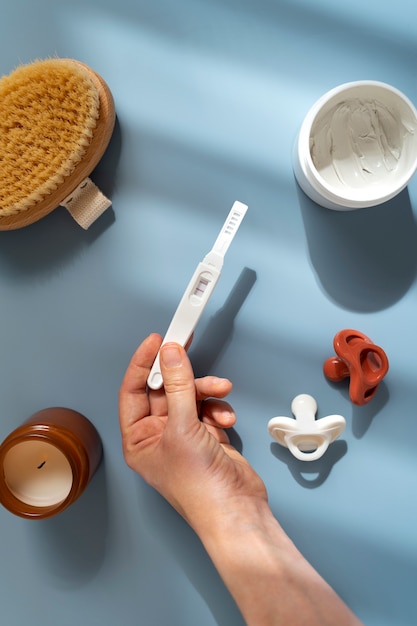
There’s always a chance that a home pregnancy test or any DIY pregnancy testing method could show a false positive or false negative result. This happens because pregnancy test results depend on several factors. If all these factors aren’t aligned, the likelihood of an inaccurate result increases significantly.
### Common Reasons for False Positive or Negative Pregnancy Test Results
Home pregnancy tests, available at medical stores, are generally reliable and provide about 97% accuracy. However, exceptions do exist due to certain conditions and factors that can alter the test’s accuracy. These tests work by detecting the hormone human chorionic gonadotropin (HCG) in your urine. HCG is produced when a fertilized egg implants into the uterus and its levels steadily rise during early pregnancy. Incorrect usage or external factors can lead to an inaccurate test result. Let’s look at some of the main reasons this can happen.
#### Chemical Pregnancy
A chemical pregnancy occurs when a fertilized egg briefly attaches to the uterine lining but fails to keep growing, often ending within a few days. This can lead to heavy bleeding, similar to a period, along with abdominal cramping. Many women aren’t even aware they experienced a chemical pregnancy unless they were actively testing for pregnancy.
A chemical pregnancy may show a false positive result because HCG starts to form even if the pregnancy is short-lived. However, due to insufficient levels of progesterone—a hormone crucial for sustaining pregnancy—the pregnancy won’t develop. Other causes of chemical pregnancies include structural issues in the uterus, such as scar tissue, fibroids, or congenital abnormalities, which may prevent the embryo from attaching or growing properly.
To avoid emotional distress, it’s generally advised to wait at least a week after your missed period to take a pregnancy test. Testing too early might result in misleading results.
#### Recent Miscarriage or Abortion
If you’ve recently had a miscarriage or abortion, a pregnancy test might still return a false positive result. This happens because the HCG hormone remains in your body for some time after the event. It takes about six weeks for HCG levels to fully decline after the end of a pregnancy.
Furthermore, if a miscarriage was incomplete or spontaneous, residual pregnancy tissue in the uterus could still produce HCG, causing the test to reflect a false positive. In such cases, dilation and curettage (D&C) may be needed to remove the remaining tissue and prevent further health complications.
#### Ectopic Pregnancy
An ectopic pregnancy occurs when a fertilized egg implants outside the uterus, most commonly in a fallopian tube. Since this is not a viable location for the embryo to develop, the pregnancy cannot proceed. However, the body still produces HCG, which can result in a false positive test.
Ectopic pregnancies are a serious health condition that requires immediate medical attention to prevent damage to the reproductive system or other complications. Symptoms might include sharp abdominal pain, shoulder discomfort, nausea, weakness, and severe cramping. If you suspect an ectopic pregnancy, consult a doctor immediately.
#### Medications
Certain medications, particularly those used for fertility treatments, can cause false positives. Drugs that trigger ovulation by simulating HCG production, such as Ovidrel, Pregnyl, or Novarel, may elevate HCG levels in your body, interfering with test results. Other medications, like anti-anxiety drugs, antihistamines, anticonvulsants, and some diuretics, can also affect test accuracy.
#### Underlying Medical Conditions
Sometimes, an HCG-positive reading isn’t related to pregnancy at all. Certain medical conditions, like ovarian cysts, urinary tract infections, kidney disorders, or even ovarian cancer, can lead to elevated HCG levels in your blood or urine, resulting in a misleading test result.
#### Incorrect Test Usage
Home pregnancy kits come with specific instructions that need to be followed closely. Errors such as not waiting the recommended amount of time before reading the results, or mishandling the test, can lead to false results. Checking the result too early might not give the test enough time to detect HCG in your sample.
#### Testing Too Early
HCG production starts only after a fertilized egg implants into the uterine lining, which typically happens 7 to 10 days after ovulation. If you test before this time, the levels of HCG in your urine might be too low for the test to detect, leading to a false negative result.
It’s best to wait for at least a week after the expected date of your missed period to ensure that HCG levels are sufficient for accurate detection.
#### Test Sensitivity
Not all pregnancy test kits are equally sensitive. Some can detect lower levels of HCG—like 20 mlU/ml—while others might only detect levels as high as 50 mlU/ml or 100 mlU/ml. If the HCG level in your urine hasn’t reached the detection threshold of the kit you’re using, it might incorrectly show a negative result. Always choose a sensitive test kit for earlier detection and follow the guidelines on the packaging.
#### Diluted Urine
Having overly diluted urine, often caused by drinking too much water, might decrease the concentration of HCG, leading to a false negative. For the most accurate result, test with your first-morning urine, when HCG levels are most concentrated.
—
If you encounter a misleading result, whether positive or negative, consider retesting a week later with a fresh pregnancy test kit. If confusion persists, consult a healthcare provider to confirm results through more reliable medical tests.